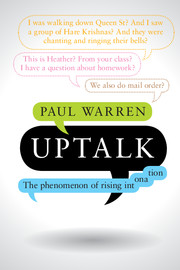Book contents
- Frontmatter
- Dedication
- Contents
- List of figures
- List of tables
- Preface
- Acknowledgements
- List of symbols and abbreviations
- 1 Introduction – why ‘uptalk’?
- 2 The forms of uptalk
- 3 The meanings and functions of uptalk
- 4 Uptalk in English varieties
- 5 Origins and spread of uptalk
- 6 Social and stylistic variation in uptalk use
- 7 Credibility killer and conversational anthrax: uptalk in the media
- 8 Perception studies of uptalk
- 9 Uptalk in other languages
- 10 Methodology in uptalk research
- 11 Summary and prospect
- References
- Index
3 - The meanings and functions of uptalk
Published online by Cambridge University Press: 05 December 2015
- Frontmatter
- Dedication
- Contents
- List of figures
- List of tables
- Preface
- Acknowledgements
- List of symbols and abbreviations
- 1 Introduction – why ‘uptalk’?
- 2 The forms of uptalk
- 3 The meanings and functions of uptalk
- 4 Uptalk in English varieties
- 5 Origins and spread of uptalk
- 6 Social and stylistic variation in uptalk use
- 7 Credibility killer and conversational anthrax: uptalk in the media
- 8 Perception studies of uptalk
- 9 Uptalk in other languages
- 10 Methodology in uptalk research
- 11 Summary and prospect
- References
- Index
Summary
It seems that there are almost as many functions and meanings ascribed to uptalk as there are magazine articles and letters-to-the-editor dealing with the phenomenon. The range of functions is also extensive in academic texts. For example, on the basis of previous research, Shokeir (2008: 17) lists uncertainty, continuation, deference, verification, facilitation, checking, grounding, negotiation, implication and lack of confidence. These functions need not of course be mutually exclusive, but the range of meanings is clearly extensive.
Guy and Vonwiller (1989: 21), writing mainly about Australian uptalk, state that of the various questions about this type of intonation, the most contentious is perhaps what it means. At around the same time, in their study of uptalk in Canadian English, James et al. (1989: 15) note that the tune has many shades of meaning, including meanings that convey emotion and attitude. It is therefore not surprising, they point out, that the tune occurs in diverse contexts and that it is consequently difficult to establish a definitive set of semantic features to characterise the contour. In a more recent review of declarative rises and models of intonational meaning, Šafářová (2006: ch. 5) concludes that some rising declaratives commit neither the speaker nor the addressee to the truth of the proposition they contain, some commit the speaker to its truth, and some are only used if the addressee is already committed to its truth. She also notes that rising declaratives can seek an evaluative response, that they can be considered to be more polite and friendly than falling declaratives, and that the paralinguistic interpretation of high rising intonation is uncertainty.
In an early investigation, Guy and Vonwiller (1984: 2) start with an initial hypothesis that since uptalk employs a tune frequently associated with questions, then its use is to question something, ‘even though it is not questioning the yes/no polarity of the clause’. They point out that it is not practical to ask people what uptalk means, not least because the intonation has acquired a stereotype. They then explore what this stereotype is, in terms of meanings and associations, i.e., as a sort of exercise in post-hoc justification of uptalk's possible meanings.
- Type
- Chapter
- Information
- UptalkThe Phenomenon of Rising Intonation, pp. 47 - 68Publisher: Cambridge University PressPrint publication year: 2016



